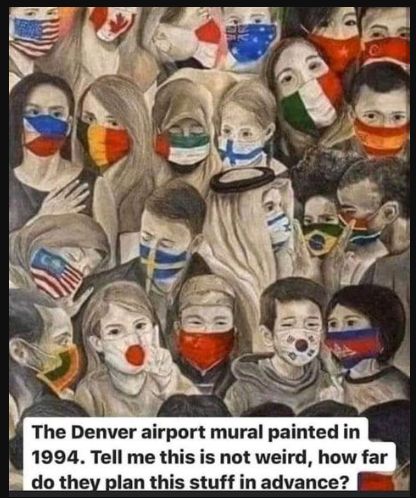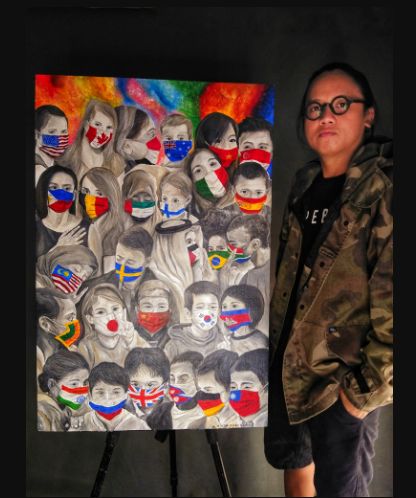1994 Denver Airport Mural Oxygen Limiting Masks Worldwide
Directly relating to speed limiters, breathing limiters —
https://wp.conspira.org/2024/02/more-lies-car-safety-standards-peggy-hall
https://wp.conspira.org/2024/01/more-big-bro-gov-insanity-speed-limiters-on-all-trucks
Preplanning for oxygen depletion dates back to at least 1994 when the Denver Airport murals “predicted” an awful future. Of course the best way to fulfill a “prediction” is to cause.
Aldous Huxley wrote, decades ago, about how most citizens would soon be purposely awash with toxins, deprived of oxygen, and routinely exposed to radiation. https://www.google.com/search?q=aldous+huxley%2C+scientific+dictatorship
Future-Predicting Murals at Denver International Airport
The Denver International Airport (DIA) has been the subject of various conspiracy theories and speculation since its opening in 1995. Among the most discussed aspects of the airport are its murals, created by artist Leo Tanguma. Two of these murals, titled “Children of the World Dream of Peace” and “In Peace and Harmony with Nature,” are often at the center of these theories due to their provocative and complex imagery.
The Murals and Their Intended Meaning
“Children of the World Dream of Peace” is a two-part mural. The first part depicts a frightening figure wearing a gas mask and military attire, destroying a building and brandishing a sword, with children and a dove (symbolizing peace) lying in its wake. The second part shows children from various countries and cultures coming together, wrapping their national flags around weapons, signifying the end of war and the triumph of peace.
“In Peace and Harmony with Nature” similarly consists of two parts. The first part shows environmental destruction and endangered animals, reflecting human impact on nature and animal extinction. The second part portrays children from around the world gathering and celebrating the restoration of the environment, symbolizing hope for a future where humanity lives in harmony with nature.
Leo Tanguma has explained that the murals were intended to address the themes of peace, harmony, and environmental responsibility. They depict a journey from a troubled and violent present to a peaceful and sustainable future, emphasizing the power of humanity to overcome threats to peace and the environment.
Conspiracy Theories
Despite the artist’s explanations, the murals have sparked a wide range of conspiracy theories. Some of the most common theories include:
– New World Order (NWO): Some theorists claim that the murals contain hidden messages or symbols related to the New World Order, a supposed secretive power elite with a globalist agenda aiming to eventually rule the world through an authoritarian world government.
– Depopulation: Theories suggest that aspects of the murals, particularly those depicting violence and environmental destruction, are actually signaling plans for mass depopulation.
– Predictions of Future Events: Others have interpreted the murals as prophetic, predicting future events such as global pandemics, environmental catastrophes, and wars. For example, the figure in the gas mask is sometimes cited as a prescient reference to future biological warfare or pandemics.
Masks and Virus Imagery
While some interpretations have attempted to link the murals’ imagery to contemporary issues such as the COVID-19 pandemic, it’s important to note that the murals were created long before these events occurred. Any connections between the murals and specific current events are speculative and not supported by the artist’s stated intentions.
Conclusion
The Denver International Airport murals by Leo Tanguma are complex works of art that tackle themes of war, peace, environmental destruction, and hope for the future. While they have become a focal point for various conspiracy theories, the artist’s own explanations highlight a message of optimism and the potential for positive change. The theories surrounding the murals reflect broader tendencies to find hidden meanings in public art, especially when it engages with social and political themes in provocative ways.

